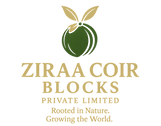Exploring the Many Uses of Coconut Husk in Daily Life
- Zira Coir Industry

- 4 days ago
- 3 min read
Coconut husk, the fibrous outer shell of the coconut fruit, is often overlooked as a waste product. However, it holds tremendous value and versatility in everyday life. From gardening to household uses, coconut husk offers sustainable and practical solutions. This article explores the various ways coconut husk can be utilized, highlighting its benefits and providing actionable tips for incorporating it into your daily routine.
Understanding Coconut Husk and Its Properties
Coconut husk is the thick, coarse fiber that surrounds the coconut shell. It is composed mainly of coir, a natural fiber extracted from the husk. This fiber is known for its durability, water retention, and biodegradability. These properties make coconut husk an excellent material for multiple applications.
The husk is typically discarded after the coconut meat and water are harvested, but it can be repurposed in eco-friendly ways. Its natural resistance to saltwater and pests also adds to its appeal for outdoor and agricultural uses.

Close-up view of coconut husk fibers showing texture
Practical Uses of Coconut Husk in Gardening and Agriculture
One of the most popular uses of coconut husk is in gardening. The fibrous material is an excellent growing medium and soil conditioner. Here are some practical ways to use coconut husk in your garden:
Soil Amendment: Coconut husk improves soil aeration and water retention. Mixing it with garden soil helps plants grow healthier by preventing waterlogging and promoting root development.
Mulching: Spread coconut husk around plants to retain moisture, suppress weeds, and regulate soil temperature.
Seed Starting: Coconut coir pots or mats provide a natural and biodegradable option for starting seeds.
Hydroponics: Coconut coir is widely used as a soilless growing medium in hydroponic systems due to its excellent water retention and aeration properties.
Using coconut husk in gardening not only enhances plant growth but also reduces reliance on synthetic materials. It is a sustainable choice that supports organic gardening practices.

High angle view of garden beds with coconut husk mulch
What is the Use of Coconut Husk?
Beyond gardening, coconut husk has many other practical uses in daily life. Here are some notable examples:
Crafts and Home Decor: The fibrous texture of coconut husk makes it ideal for crafting items like mats, brushes, ropes, and baskets. These handmade products are durable and eco-friendly.
Animal Bedding: Coconut husk fibers provide comfortable and absorbent bedding for pets and livestock.
Fuel Source: Dried coconut husk can be used as a biomass fuel for cooking or heating.
Erosion Control: Coconut coir mats and logs are used in landscaping to prevent soil erosion on slopes and riverbanks.
Cleaning Tools: Brushes made from coconut husk fibers are effective for scrubbing and cleaning due to their stiffness and durability.
These diverse uses demonstrate the versatility of coconut husk and its potential to replace synthetic or less sustainable materials in many areas of life.

Eye-level view of handmade coconut husk brushes on display
How to Source and Use Coconut Husk Effectively
If you want to start using coconut husk, it is important to know where to source it and how to handle it properly. Coconut husk is widely available in tropical regions where coconuts are grown. It can be purchased in raw or processed forms such as coir mats, blocks, or loose fibers.
When buying coconut husk, consider the coconut husk price per kg to find the best deals and quality. Prices vary depending on processing and packaging.
To use coconut husk effectively:
Prepare the Husk: If using raw husk, soak it in water to soften the fibers before use.
Combine with Other Materials: Mix with compost or soil for better nutrient content.
Maintain Moisture: Keep coconut husk moist when used as mulch or growing medium to maximize its benefits.
Replace Periodically: Coconut husk decomposes over time, so replace it regularly to maintain effectiveness.
By following these tips, you can maximize the benefits of coconut husk in your projects and daily activities.
Innovative and Emerging Uses of Coconut Husk
The potential of coconut husk continues to grow as new applications are developed. Some innovative uses include:
Bio-composites: Coconut husk fibers are being used to create eco-friendly composite materials for automotive and construction industries.
Activated Carbon: Coconut husk can be processed into activated carbon for water purification and air filtration.
Packaging Material: As a biodegradable alternative to plastic, coconut husk-based packaging is gaining popularity.
Health and Beauty Products: Extracts from coconut husk are used in exfoliating scrubs and natural skincare products.
These emerging uses highlight the importance of coconut husk as a sustainable resource with wide-ranging benefits.
Coconut husk is a remarkable natural material with many practical uses in daily life. From gardening and crafts to innovative industrial applications, it offers eco-friendly alternatives that support sustainability. By exploring and adopting the various uses of coconut husk, individuals and businesses can contribute to a greener future while enjoying the functional benefits of this versatile fiber.




Comments